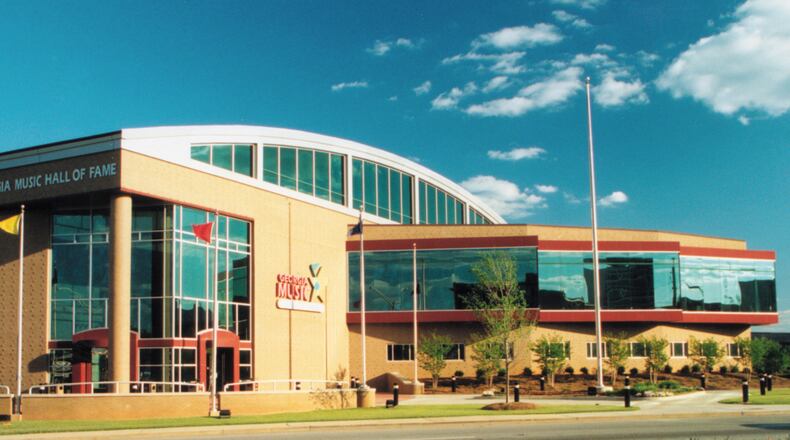Georgia got out of the business of funding a Macon music museum during the economic downturn. Now, eight years after the museum closed, amid a booming economy, state and Fulton County governments have ponied up $500,000 to see if there's a market for a new Grammy museum in Atlanta.
Details of the new proposal are sparse, but a state agency and the Fulton commission have each earmarked $250,000 to assess potential costs to build a Grammy museum as well as the impact on tax revenues if one is built.
Bert Brantley, the chief operating officer of the state Department of Economic Development, said the General Assembly in recent years made marketing Georgia as a music production hub a top priority. Lawmakers also recently sweetened incentives to lure music producers here.
"Our strength in various music types is well known, but it is certainly prudent to look at other similar efforts, including previous experiences here in Georgia, to determine the best path forward," Brantley said. That was an allusion to the former Georgia Music Hall of Fame, in Macon, which suffered from low attendance and closed in 2011 after the state cut its funding.
“We don’t have any preconceived ideas going in,” he said. “We are trusting the study will provide relevant information for state decision makers to use when determining what the state’s role, if any, should be.”
A spokeswoman for the Grammy Museum, which is based in Los Angeles, said the proposal was preliminary and declined further comment. A representative of Georgia Music Accord, the local group that's pushing for the museum and which contracted with the state to coordinate the feasibility study, did not respond to several phone calls seeking comment.
The flagship Grammy Museum features four stories of interactive exhibits and treasured musical artifacts. It sits in the L.A. Live entertainment district near the Staples Center.
A Grammy museum in Mississippi opened in 2016 showcasing the state’s musical roots. An exhibit in Nashville honors country music, and a New Jersey annex highlights homegrown artists including Whitney Houston and Frank Sinatra.
Georgia's musical history crosses many genres — from country to hip-hop, rhythm and blues to Southern rock. The study is expected to suggest a focus for the museum and potential future programming, as well as the best location for the museum.
Among the areas of analysis will be construction and operating costs and sources of potential funds.
The Atlanta Convention & Visitors Bureau isn’t involved in the proposal, but chief sales officer Mark Vaughan said he thought highlighting the city’s creative class would give visitors another reason to discover the city.
The Grammy brand is well-known and a museum could draw crowds, especially if it’s built near popular destinations like the World of Coca-Cola and the Georgia Aquarium, said Debby Cannon, who heads the hospitality school at Georgia State University.
“It brings in a cultural element,” she said. “The return on investment, I think, will be pretty quick and significant.”
But Cannon cautioned that the new museum would need to go beyond the offerings of the former state music hall to succeed.
“Just transplanting what already existed would really be a missed opportunity,” she said. “What we had in Macon was a start, but it’s not really a model of what’s successful today.”
Before it closed, the music hall had roughly 30,000 artifacts and featured exhibits on Georgia artists including Otis Redding, James Brown, the Allman Brothers Band and Little Richard.
The state maintains control of much of the hall’s library of recordings and memorabilia, which could make their way into a new Grammy attraction, state officials said.
Some material went to the University of Georgia, Georgia State and the University of West Georgia, while other artifacts were donated to the Tubman African-American Museum and the Allman Brothers Band Museum in Macon.
The state first entered the “hall of fame” business in the 1990s. Leaders hoped the music and sports halls in Macon and the golf and gardens facility in Augusta would spur tourism. The state spent $65 million in taxpayer dollars to build and operate the facilities over 20 years.
One forecast predicted the music hall could draw between 250,000 and 350,000 visitors per year, but the complex drew about one-tenth of that annually in the decade before its closure, the AJC found in 2011.
From 2007 to 2011, the state spent about $3.2 million to support the music hall's operations. The state support amounted to more than half the hall's budget.
Five Fulton commissioners voted to support the Grammy museum proposal.
Commissioner Marvin Arrington called it a “great opportunity,” while Commissioner Liz Hausmann said she thought a proposed educational component would help keep young people from going elsewhere to find jobs.
“I think this has so many positive aspects for our community,” she said.
Commissioner Bob Ellis, who did not vote on the measure, said at a meeting in May when the proposal was first discussed that he had a "degree of wariness about museums in general because there's a lot of roadkill on that highway" when it comes to failed projects.
J.C. Bradbury, a Kennesaw State University economics professor, said the study sounded “like a classical waste of money.”
He said most of those who would visit such a museum would be tourists who were already in Atlanta, and the effect would be too small to justify a subsidy via the study.
“I can’t imagine a positive economic impact,” he said. “The Grammys are boring enough to watch.”
Staff writer Melissa Ruggieri contributed to this story.
The Latest
Featured



